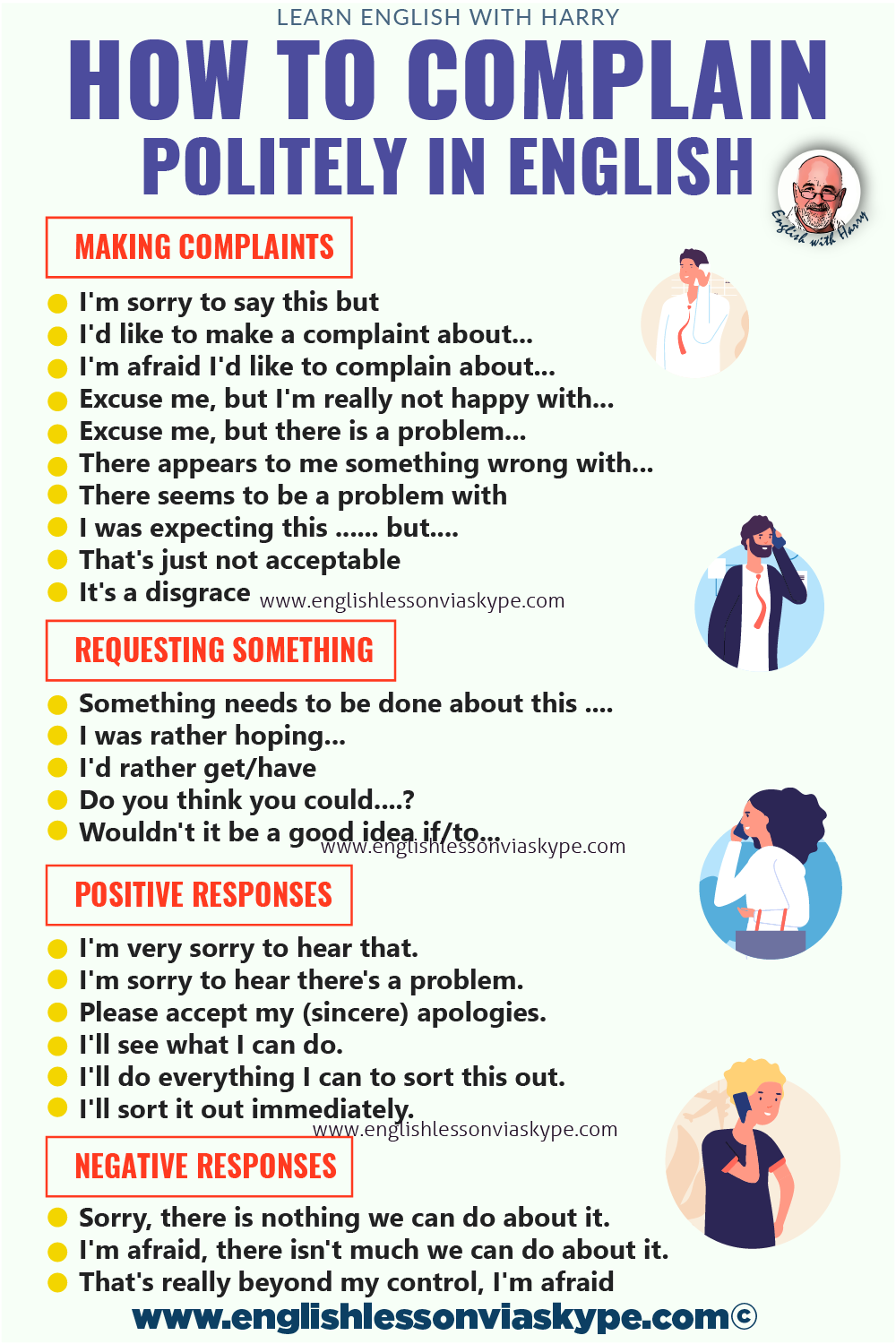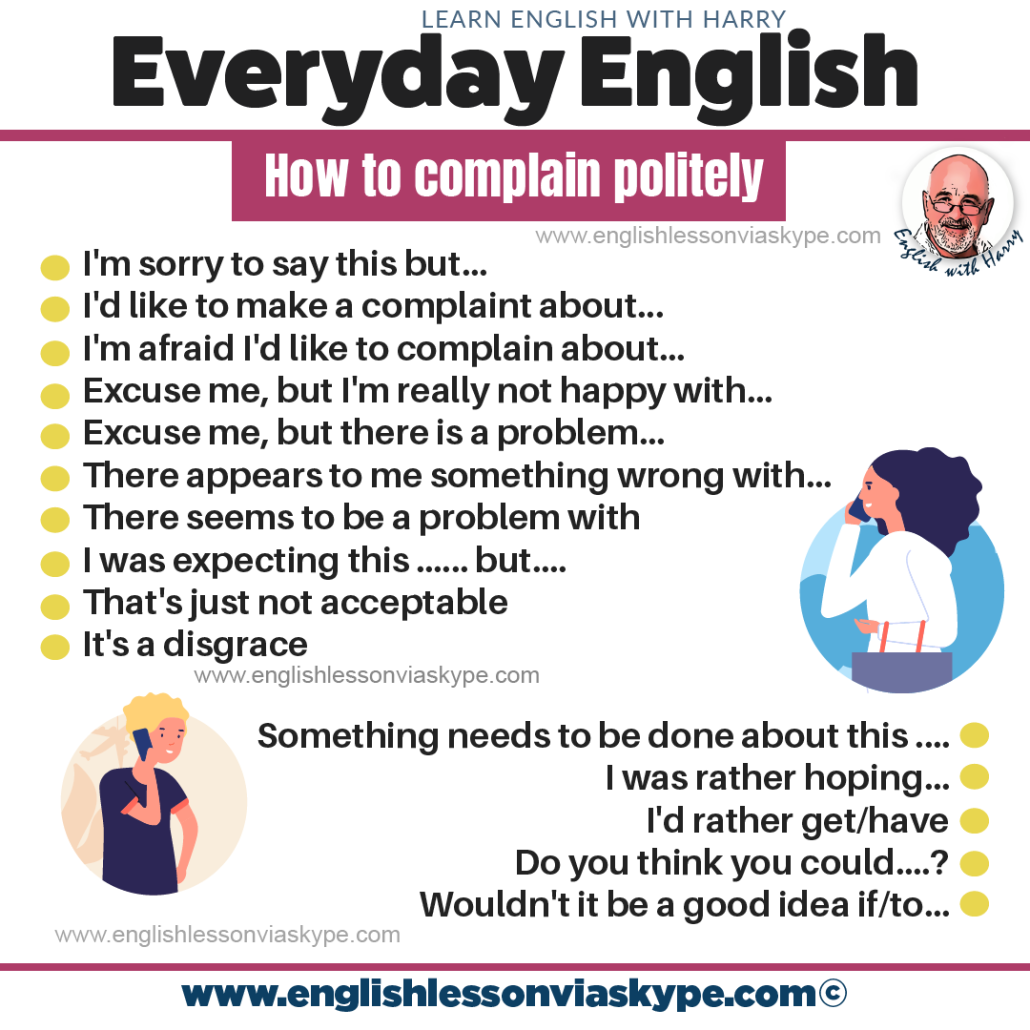Learn how to complain politely in English. Useful English expressions for making complaints. Positive and negative responses to complaints in English.
Advance your English vocabulary and start speaking like a native speaker!
Listen to the podcast Speak Better English with Harry or watch it on YouTube at Learn English with Harry.
Making complaints in English
Harry
how to complain politely in English
Hi there, everybody. And welcome back to my English lessons. This is teacher Harry here, good to see you again. What we’re going to try and do today is to try and give you some practical examples of some English language.
I’m a firm believer that English is better spoken if it is spoken naturally. And simply. So we’re trying to do that and give you expressions and phrases that will help you to get involved with the English language in a much better way. As I said, more practical.
Well, today we’re going to talk about arguments and complaints. Okay, so how do you make a complaint, so I’m going to break it down into a few parts.
The first part is how you actually make a complaint in English. So I’ll give you some expressions and phrases and examples of how you do that.
Then we’ll look at when you’re requesting something. So how you can request that.
Then we’ll look at how you reply or respond to a particular complaint.
And then finally, we’ll look at negative responses to complaints. So four practical ways in which you can deal with make or as we sometimes say, in English, in a more formal basis to lodge a complaint.
give a gift of learning Offer up to 50% off
Great way to improve your English. Use code END2023

So when you’re making a complaint, it’s really important to start off politely, in the English language, as we’ve said many times, you’ll probably get a better response from somebody if you’re a little bit more polite. So we try to use more indirect language than direct language.
So instead of saying,
- What’s there?
- What was that?
We would say,
Sorry, but could you help me with that?
So make it more indirect. When you’re making a complaint, the first thing to notice is to be polite. So a couple of expressions that you might use in relation to that.
I’m sorry to bother you.
Or you could say,
Excuse me, I wonder if you could help me?
phrases for making complaints in English
I’m going to give you a list of the phrases expressions we’ll use, and then we’ll give you some examples of those.
- I’m sorry to say this, but…
- I’d like to make a complaint about…
- I’m afraid I’d like to complain to you.
- Excuse me, but I’m really not happy with…
- Excuse me, but there seems to be a problem…
- There appears to be something wrong with…
- I was really upset when…
- I was expecting (something) but…
And then some quite firm statements.
- That’s just not acceptable.
- It’s a disgrace.
I’m sorry to say this, but the soup is cold, I really can’t eat it. Could you take it to the kitchen, perhaps reheat it?
I’d like to make a complaint about this article of clothing that I bought in your store last week.
I’d like to make a complaint about the clothes that I bought here last week, here’s my receipt.
Excuse me, but I’d like to make a complaint. I’m really not happy with this delay.
Excuse me, but I’m really not happy with your response. I bought this yesterday.
Excuse me, but there’s a problem with the elevator. I’ve been waiting here for 10 minutes.
book your trial English Lesson
If we’re not sure about something or we want to be a little less forceful, then we can soften our language a little bit by saying
There appears…
So when we say there appears we’re not saying that actually is.
There appears to be something wrong with…
You want to tone down your complaint. So there appears to be something wrong with this is just a gentle way of asking or making a complaint.
Now, if we want to be really firm about something, we can add words like
- very
- really
They add emphasis to everything. Once you just add those words, they emphasise whatever you’re saying.
If you’re making a complaint, you can add them also, for example,
I was really upset when I took this garment home, I was going to wear it last night. When I took it out of the bag, there was a big mark on it, and I couldn’t wear it.
I was really upset, I was very upset.
So it’s not just upset, it’s very upset. It’s not just upset, it’s really upset.
Just use those words, to add a bit of emphasis if you want to make your complaint a little bit stronger, and a little bit more firm.
how to complain politely in English

Share and help other students to improve English language skills.
Okay, so other ways you can say
This is just not acceptable. I expect more from a hotel with your reputation. It is just not acceptable.
So it’s really, really quite strong language. You’ve stressed it by saying this is really not acceptable or it’s unacceptable. It depends on which way you want to say it.
Or, again, if you want to be very, very firm.
It’s a disgrace.
If you want to add more,
It’s an absolute disgrace. I’ve waited for a week to get my car back. When I get it back, I drive it no more than half a kilometre and it breaks down.
So you’re really really annoyed and the person, mechanic, is probably aware looking at your face, and by the sound of your voice that something radically is wrong. Okay?
speak better English with Harry - Episode 342
phrases for making polite requests
So now we’ll switch to the second part. And we’re talking about things when we want to request something. So we’re still talking about complaints. But we want to again, do it in a more polite way. So we’re using some words or expressions that we are going to request that something is done. Okay, so let me give them to you one by one, and then I go through them with some examples.
- I was really hoping. I was really hoping that…
- I’d rather have or I’d rather get.
- Do you think you could?
- Something needs to be done about this.
- Wouldn’t it be a good idea if/to…?
Okay, so you are making suggestions or requests that you want a certain action to happen so that your problem or your complaint will be resolved completely. So let me give you the examples.
I’ve rung you twice. Before I’ve sent you some emails. Something really needs to be done about this as soon as possible. It’s becoming a health issue.
Something needs to be done about this soon.
Something needs to be done about this, as soon as possible.
Something needs to be done about this immediately.
I was rather hoping that I could just exchange it for another dress of the same value.
I’d rather get my money back.
I’d rather have it exchanged.
If you want to give somebody some help in coming to the conclusion that you want, you might want to put words like,
Wouldn’t it be a good idea?
Wouldn’t it be a good idea to put an announcement in the media?
how to complain politely in English

phrases for positive responses to complaints
Let’s then go on to the third section. Okay, so the third section here is about responding to complaints. The first part is going to be responding in a positive way.
- I’m very sorry to hear that.
- I’m sorry to hear there’s a problem.
- Please accept my (sincere) apologies.
- I’ll see what I can do immediately.
- I’ll do everything that I can to sort it out.
- I’ll sort it out immediately.
Okay, so these are all very positive responses to a complaint.
Please accept my sincere apologies. There’s been a little problem in the kitchen with the electrics.
I’ll see what I can do to get somebody out to you today. I cannot promise it.
I’ll do everything that I can to make sure that your problem is resolved, before closing of business.
how to complain politely in English
phrases for negative responses to complaints
So the last bit of this then is about impolite answers to the complaint. Okay, so this would be a response, that would be negative. Okay, so let’s look at that.
- I’m sorry, there’s nothing we can do about it.
- It’s out of our hands/control.
- That’s really beyond/out of my control.
- I’m afraid there’s nothing I can do at the moment.
So these will be negative responses.
As the person making the complaint, you definitely don’t want to hear this because you’re hoping that your problem will be resolved. But occasionally, you’re going to have to accept this, particularly when it’s a natural issue, like the thunderstorm the lightning or the flooding. Of course, we all are annoyed or frustrated with that. But really, there’s nothing we can do. So this is what you’ll hear.
So we’ve looked at the language of complaints.
We’ve looked at how to complain politely in English.
We’ve looked at the way you should request some assistance when you have a complaint.
Then finally, two issues, positive and negative responses to complaints.
So hopefully, this gives you a better understanding of how the English language works and how you can make complaints or receive complaints in English.
I hope you’ve enjoyed that. As always, if you want to contact me, you can do so at www.englishlessonviaskype.com.
Always happy to hear from you always happy to hear your suggestions. Thanks for watching. Thanks for listening.
Join me again soon.
More information
For more information on English grammar rules, English collocations and English idioms, check out the links below:
Expressing likes and dislikes in English
You can always study English advanced level at Learning English with the BBC.
You will love these English lessons

16 Christmas Phrasal Verbs
Learn 16 Christmas phrasal verbs! Hang up meaning, put up meaning, take down meaning. You can use festive phrasal verbs
Commonly Confused Homophones in English
Have you ever looked at some English words that are spelled differently pronounced the same but have different meanings? These


13 Phrasal Verbs with LET
Here you will learn 13 phrasal verbs with Let. Things we will go through include: let somebody down meaning, let